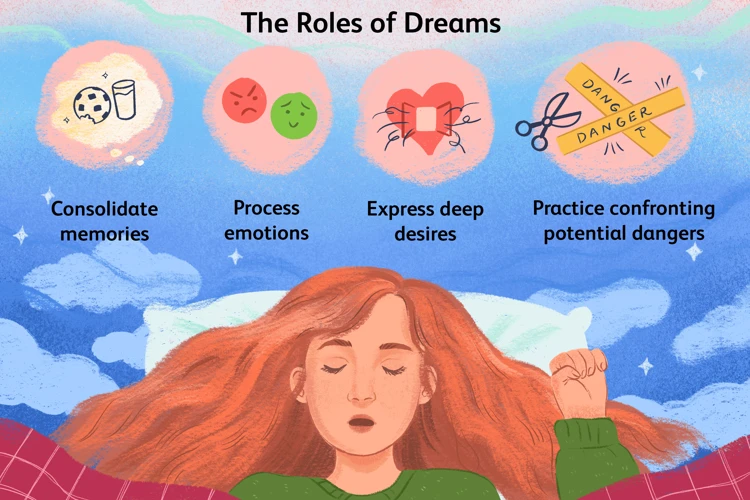In the realm of our unconscious minds, dreams can take us on fantastical journeys that captivate, confuse, and sometimes frighten us. However, the content of our dreams can be influenced by a variety of factors, including the medications we take. Certain medications have been associated with changes in dream content and an increased likelihood of experiencing nightmares. Understanding the impact of medications on dreams is crucial for individuals who may be experiencing disrupted sleep patterns or distressing dream experiences. In this article, we will explore the different medications that can affect dream content, the common medications associated with nightmares, and how these medications influence our dreams. We will also delve into the factors that can influence the impact of medications on dreams and discuss strategies to manage medication-related dreams. So, let us embark on this journey through the world of dreams and medications, and unravel the mysteries that lie within.
Medications that Affect Dream Content

Several medications have been found to influence the content of our dreams. These medications can either enhance dream vividness or alter the overall dream experience. Here are some medications known to affect dream content:
- Antidepressants: Certain types of antidepressants, such as selective serotonin reuptake inhibitors (SSRIs) and tricyclic antidepressants (TCAs), have been associated with changes in dream content. These medications can increase dream frequency, vividness, and emotional intensity.
- Antipsychotics: Some antipsychotic medications, like clozapine and risperidone, may influence dream content by causing more vivid dreams or nightmares. These effects may be attributed to the medications’ impact on neurotransmitter levels in the brain.
- Beta-blockers: Beta-blockers, commonly prescribed for conditions like hypertension and anxiety, have also been linked to changes in dream content. These medications can potentially affect the emotional tone of dreams, making them more negative or intense.
- Cholinesterase inhibitors: Cholinesterase inhibitors, used in the treatment of Alzheimer’s disease, can influence dream content by increasing the intensity of dreams and potentially causing nightmares.
- Nicotine replacement therapies: Nicotine replacement therapies, such as nicotine patches or gum, have been reported to affect dream content. Users of these therapies have described experiencing more vivid dreams compared to when they are not using nicotine replacement products.
It is important to note that the effect of these medications on dream content can vary from individual to individual. While some individuals may experience altered dream content, others may not notice any significant changes. Additionally, the impact of these medications on dream content may also be influenced by other factors, such as dosage and individual susceptibility. Understanding the potential effects of these medications can help individuals better comprehend their dream experiences and seek appropriate guidance from healthcare professionals.
Common Medications Associated with Nightmares

Nightmares can be distressing experiences that disrupt our sleep and leave us feeling unsettled. While nightmares can be caused by various factors, certain medications have been identified as potential contributors to nightmare occurrence. These medications include:
- Beta-blockers: As mentioned earlier, beta-blockers can affect dream content, and in some cases, this can lead to an increased likelihood of experiencing nightmares. Beta-blockers may disrupt normal sleep patterns and trigger more intense or vivid nightmares. It is important to discuss any sleep disturbances or nightmares with a healthcare provider if using beta-blockers.
- Antidepressants: While antidepressants can influence dream content, they may also contribute to the occurrence of nightmares. This is particularly true for medications such as selective serotonin reuptake inhibitors (SSRIs) and serotonin-norepinephrine reuptake inhibitors (SNRIs). Changes in neurotransmitter levels induced by these medications may disrupt sleep architecture, leading to increased nightmare frequency and intensity.
- Anticonvulsants: Certain anticonvulsant medications used to treat epilepsy, such as phenytoin and vigabatrin, have been associated with an elevated risk of nightmares. The exact mechanism by which these medications cause nightmares is not fully understood, but it is believed to be related to their impact on the central nervous system and brain activity during sleep.
- Withdrawal from substances: It is worth noting that the discontinuation or withdrawal from certain substances, such as benzodiazepines, alcohol, or recreational drugs, can also lead to an increase in nightmares. These substances can have a direct influence on dream content, and when their use is interrupted, it can cause a rebound effect on REM sleep, leading to more vivid and disturbing dreams.
It’s crucial to consult with a healthcare provider if nightmares become persistent or significantly impact one’s quality of life. They can provide guidance on potential medication adjustments or alternative options to alleviate this side effect. Additionally, lifestyle changes and implementing good sleep hygiene practices can also contribute to managing nightmares. By addressing the underlying factors contributing to nightmares, individuals can experience more restful sleep and a reduction in distressing dream experiences.
How Medications Influence Dream Content

Medications can influence dream content through various mechanisms, ultimately altering the nature and themes of our dreams. One key mechanism is the alteration of neurotransmitter levels in the brain. For example, antidepressants like SSRIs increase the availability of serotonin, which can lead to more vivid and emotionally intense dreams. Similarly, antipsychotics and cholinesterase inhibitors affect neurotransmitter systems, potentially causing more vivid dreams or nightmares. Another way medications influence dream content is by disrupting sleep architecture. Some medications, particularly those that affect the central nervous system, can disrupt the normal sleep cycles and stages, leading to more fragmented and disrupted sleep. This, in turn, can impact the quality and content of dreams. Understanding these mechanisms helps shed light on the intricate relationship between medications and dream experiences, providing valuable insights for those navigating medication-related dreams.
Neurotransmitter Alterations
Neurotransmitter alterations play a significant role in how medications can affect dream content. The following are examples of neurotransmitters that may be influenced by medications, ultimately impacting our dreams:
- Serotonin: Medications that affect serotonin levels in the brain, such as SSRIs and TCAs, can lead to changes in dream content. Serotonin is involved in regulating mood and emotions, and alterations in its levels can contribute to vivid and emotionally intense dreams.
- Dopamine: Drugs that modulate dopamine activity may also have an impact on dream content. Some antipsychotic medications, which target dopamine receptors, can potentially alter the quality and intensity of dreams.
- Acetylcholine: Changes in acetylcholine levels, influenced by medications like cholinesterase inhibitors, can lead to increased dream intensity and the occurrence of nightmares.
These medications can either enhance or suppress the activity of these neurotransmitters, which in turn affects the neurochemical balance necessary for normal dream experiences. By modifying the levels of these chemicals in the brain, medications can potentially alter dream content, leading to heightened vividness, emotionally charged dreams, or an increased likelihood of nightmares. It is essential to recognize the role of neurotransmitter alterations when considering the impact of medications on dream content.
Sleep Architecture Disruption
One of the ways in which medications can influence dream content is by disrupting the normal sleep architecture. Sleep architecture refers to the different stages of sleep that we cycle through during the night. These stages include non-rapid eye movement (NREM) sleep and rapid eye movement (REM) sleep. REM sleep is the stage during which dreaming occurs.
Some medications, such as certain antidepressants and antipsychotics, can affect the distribution and duration of these sleep stages. For example, antidepressants like SSRIs have been found to suppress REM sleep and increase the duration of NREM sleep. This alteration in sleep architecture can lead to changes in dream content, potentially reducing the frequency and intensity of dreams. On the other hand, abrupt discontinuation of these medications can cause REM rebound, leading to more vivid and intense dreaming.
Additionally, medications that cause disruptions in sleep continuity, such as those used to treat sleep disorders like insomnia, can also influence dream content. When sleep is fragmented or interrupted, there is an increased likelihood of dream recall and more intense dream experiences. The fragmented sleep patterns caused by these medications can result in more vivid and memorable dreams, potentially including nightmares.
It is worth noting that the specific impact of medication-induced sleep architecture disruption on dream content can vary from person to person. Factors such as individual susceptibility, dosage, and timing of medication intake can influence how an individual responds to these changes. Understanding the potential effect of medication-related sleep architecture disruption can provide insight into the relationship between medications and dream experiences, allowing individuals to better manage and navigate their dream content.
Factors influencing the Impact of Medications on Dreams

The impact of medications on dreams can be influenced by several factors, which contribute to the individual variation in dream experiences. Two key factors include dosage and timing, as well as individual susceptibility. Dosage and timing: The dosage and timing of medication intake can significantly affect dream content. Higher doses of certain medications may increase the likelihood of experiencing vivid dreams or nightmares, while taking medications closer to bedtime can enhance their influence on dream content. Individual susceptibility: Each person’s response to medications and their impact on dreams can vary. Some individuals may be more susceptible to changes in dream content, while others may experience minimal effects. Factors such as overall health, neurochemistry, and pre-existing sleep conditions can contribute to this individual susceptibility. By considering these factors, individuals can gain a better understanding of how medications may influence their dreams and seek appropriate guidance from healthcare professionals if needed.
Dosage and Timing
Dosage and timing play a crucial role in determining the impact of medications on dream content. Both factors can significantly influence the intensity and frequency of medication-related dreams. Here’s how dosage and timing come into play:
Dosage:
The dosage of a medication can directly affect dream content. Higher doses of certain medications, such as antidepressants and antipsychotics, may increase the likelihood of experiencing vivid dreams or nightmares. Additionally, adjusting the dosage of a medication can lead to changes in dream experiences. For example, reducing the dosage of an antidepressant may result in a decrease in dream intensity, while increasing the dosage may enhance dream vividness. It is essential for individuals to communicate any changes or concerns about dream experiences with their healthcare providers to determine the appropriate dosage for their specific needs.
Timing:
The timing of medication administration can also impact dream content. Taking medications that affect the central nervous system closer to bedtime may increase the likelihood of experiencing medication-related dreams. This is particularly relevant for medications with sedative properties, as they can influence the sleep cycle and dream experiences. It is recommended to follow healthcare provider’s instructions regarding the timing of medication intake to minimize the potential impact on dream content.
It’s important to remember that the influence of dosage and timing on dream content can vary among individuals. Factors such as metabolism, overall health, and other medication interactions can also influence the effects. Monitoring and communicating any changes in dream experiences to healthcare providers is essential for effective management.
Individual Susceptibility
When it comes to the impact of medications on dream content, individual susceptibility plays a crucial role. Different people may have varying responses to the same medication, leading to differences in dream experiences. Factors that contribute to individual susceptibility include:
- Neurobiological Differences: Each person’s brain chemistry and structure are unique, which can influence how medications interact with neurotransmitters and receptors involved in dream formation. These variations in neurobiology can contribute to differences in dream content.
- Personal Sensitivities: Individuals may have personal sensitivities that make them more prone to experiencing changes in dream content. For example, someone with a history of nightmares or highly vivid dreams may be more susceptible to the effects of medications on their dream experiences.
- Psychological Factors: Individual psychological factors, such as stress levels, emotional well-being, and overall mental health, can impact dream content. Medications that affect mood or neurotransmitter regulation may interact with these psychological factors to influence dream experiences.
- Sleep Quality: The quality and duration of sleep can also influence dream content. Disrupted sleep patterns or inadequate sleep may increase the likelihood of unusual or vivid dreams. Medications that affect sleep architecture may indirectly alter dream content through their impact on sleep quality.
It is essential for individuals to recognize their own susceptibilities and communicate any notable changes in dream content to their healthcare providers. By understanding individual differences, healthcare professionals can better assess the impact of medications on dream experiences and make appropriate adjustments if necessary. Additionally, individuals can explore techniques such as dream journaling or seeking the expertise of dream analysts to gain further insights into their dream content. Understanding the intricacies of individual susceptibility can help individuals navigate their dream experiences and seek tailored approaches for managing any disturbances or concerns.
Strategies to Manage Medication-Related Dreams
For individuals experiencing medication-related dreams, there are several strategies that can help manage and alleviate the impact of these dreams. Here are some strategies to consider:
- Communication with Healthcare Providers: It is crucial to discuss any changes in dream content or increased nightmare frequency with your healthcare provider. They can provide valuable insight into the potential effects of the medication and further adjust the dosage or explore alternative options if necessary.
- Alternative Medication Options: In some cases, switching to a different medication or adjusting the timing of medication intake may help minimize the impact on dream content. Consulting with a healthcare provider can help determine if this is a viable option.
- Lifestyle Changes and Sleep Hygiene: Implementing good sleep hygiene practices, such as maintaining a consistent sleep schedule, creating a relaxing bedtime routine, and creating a comfortable sleep environment, can contribute to overall better sleep quality and potentially help manage medication-related dreams.
By employing these strategies, individuals can gain better control over their dream experiences and find ways to mitigate any distressing or disruptive effects caused by medications. Remember, everyone’s experience with medication-related dreams is unique, so it is important to work closely with healthcare professionals to find the most suitable approach.
Communication with Healthcare Providers
When experiencing changes in dream content or distressing dream experiences due to medications, it is crucial to maintain open and honest communication with healthcare providers. Regularly discussing any dream-related concerns with your healthcare provider can help ensure appropriate management of these effects. Here are some steps to effectively communicate with your healthcare provider:
- Keep a dream journal: Keeping a dream journal can provide valuable information about the frequency, intensity, and content of your dreams. Note down any specific medications you are taking and their dosages, along with details about your dreams. This journal can serve as a reference point during discussions with your healthcare provider.
- Describe your dream experiences: When discussing your dreams with your healthcare provider, provide as much detail as possible. Describe any changes in dream frequency, vividness, emotional intensity, or occurrence of nightmares. This information can help your provider understand the impact of medications on your dream content.
- Ask questions: Don’t hesitate to ask questions about the medications you are taking and their potential effects on dream content. Seek clarification on any concerns or uncertainties you may have, such as whether adjusting medication dosage or timing could help alleviate dream-related issues.
- Explore alternative options: If medication-related dreams are causing significant distress, discuss potential alternative medication options with your healthcare provider. They may be able to recommend alternative medications that have a lower likelihood of impacting dream content.
- Consider a collaborative approach: In some cases, collaborating with your healthcare provider and possibly a mental health professional, such as a psychiatrist or psychologist, may be beneficial. They can work together to assess your overall mental health, monitor the impact of medications on your dreams, and recommend appropriate strategies to manage any distressing dream experiences.
Remember, effective communication with your healthcare provider is essential for addressing any concerns related to medication-induced changes in dream content. Through open dialogue, you can work together to find the most suitable solutions for managing these effects and promoting restful sleep.
Alternative Medication Options
For individuals who experience undesirable dream effects from their medications, exploring alternative medication options may be a consideration. Consulting with a healthcare provider is essential to discuss potential alternatives and determine the most suitable course of action. Here are a few alternative options that could be explored:
- Medication Adjustment: In some cases, adjusting the dosage or timing of the current medication may alleviate the impact on dream content. This could involve reducing the dosage, switching to an extended-release formulation, or taking the medication at a different time of day to minimize its influence on dreams.
- Medication Substitution: In certain situations, switching to a different medication within the same therapeutic class might be a viable option. This could involve trying an alternative antidepressant or antipsychotic medication with a potentially lower impact on dream content.
- Non-Drug Approaches: Depending on the underlying condition being treated, exploring non-drug approaches may also be worth considering. These approaches could include therapy techniques, such as cognitive-behavioral therapy (CBT) or relaxation exercises, which may help manage symptoms without the need for medication. However, it is crucial to consult with a healthcare provider before making any changes to the treatment plan.
Exploring alternative medication options should always be done in consultation with a healthcare provider, as they can provide guidance based on the individual’s specific needs and medical history. It is important to weigh the potential benefits and risks of any alternative medication option and consider the impact it may have on dream content and overall well-being. Seeking professional advice can help individuals make informed decisions regarding their medication regimen and optimize their dream experiences.
Lifestyle Changes and Sleep Hygiene
Implementing lifestyle changes and practicing good sleep hygiene can be effective strategies for managing medication-related dreams. Here are some tips to consider:
- Establish a consistent sleep schedule: Maintaining a regular sleep schedule can help regulate your sleep-wake cycle and promote better sleep. Try to go to bed and wake up at the same time every day, even on weekends.
- Create a relaxing bedtime routine: Engage in calming activities before bed, such as reading a book, taking a warm bath, or practicing relaxation techniques like deep breathing or meditation. Avoid stimulating activities and electronic devices close to bedtime.
- Create a sleep-friendly environment: Make sure your bedroom is cool, quiet, and completely dark. Use earplugs, eye masks, or white noise machines if necessary to block any disruptive noises or light.
- Avoid stimulating substances: Limit your consumption of caffeine, nicotine, and alcohol, especially in the evening. These substances can interfere with your ability to fall asleep and disrupt the quality of your sleep.
- Exercise regularly: Engaging in regular physical activity can help promote better sleep. However, it is important to avoid exercising too close to bedtime, as it can increase alertness and make it harder to fall asleep.
- Manage stress: Chronic stress can negatively impact sleep. Practice stress management techniques, such as journaling, practicing mindfulness, or seeking support from a therapist or counselor.
- Discuss medication alternatives with your healthcare provider: If medication-related dreams are causing significant distress or affecting your quality of life, talk to your healthcare provider about potential alternative medications that may have fewer effects on dream content.
By incorporating these lifestyle changes and practicing good sleep hygiene, you can create an environment that promotes restful sleep and may help mitigate the impact of medication-related dreams. Additionally, if you are experiencing distressing or recurrent nightmares, exploring the potential symbolism of nightmares and seeking appropriate interpretations can provide additional insights into their underlying meanings.
Conclusion
Dreams have long fascinated and intrigued us, offering a glimpse into the depths of our unconscious minds. Medications, as we’ve explored in this article, have the potential to influence dream content and even give rise to nightmares. By understanding the medications that can affect dream content, such as antidepressants, antipsychotics, beta-blockers, cholinesterase inhibitors, and nicotine replacement therapies, individuals can better navigate their dream experiences and seek appropriate support if needed. It’s important to remember that the impact of these medications on dreaming can vary from person to person, and other factors like dosage and individual susceptibility can also play a role. Nightmares can be distressing, but they often hold valuable symbolic meaning. Exploring the influence of medications on dream content allows us to delve deeper into the intricate relationships between our minds, medications, and sleep. By communicating openly with healthcare providers and considering alternative medication options, individuals can find strategies to manage medication-related dreams. Additionally, incorporating healthy lifestyle changes and practicing good sleep hygiene can further promote restful sleep and potentially alleviate any disruptive dream experiences. So, embrace the mysterious world of dreams, and may your nights be filled with dreams that bring you joy, insight, and peaceful slumber.
Frequently Asked Questions
1. Can medication really affect the content of our dreams?
Yes, certain medications have been found to influence the content of our dreams. They can enhance dream vividness, emotional intensity, and even increase the frequency of dreams.
2. Do all antidepressants affect dream content?
No, not all antidepressants affect dream content. However, selective serotonin reuptake inhibitors (SSRIs) and tricyclic antidepressants (TCAs) are known to have an impact on dream experiences.
3. Can beta-blockers cause nightmares?
While not everyone experiences it, some individuals taking beta-blockers have reported experiencing more vivid and intense dreams, including nightmares. However, it’s important to consult with your healthcare provider if you have concerns.
4. Do cholinesterase inhibitors always influence dream intensity?
Cholinesterase inhibitors, commonly used in Alzheimer’s disease treatment, have been associated with increased dream intensity. However, the effect on dream content may vary from person to person.
5. How do antipsychotics impact dream content?
Antipsychotics, such as clozapine and risperidone, can influence dream content by potentially causing more vivid dreams or nightmares. This effect could be related to their impact on neurotransmitter levels in the brain.
6. Can nicotine replacement therapies affect dream experiences?
Yes, individuals using nicotine replacement therapies, like patches or gum, have reported experiencing more vivid dreams compared to when they are not using such products.
7. Are there any strategies to manage medication-related dreams?
Yes, there are strategies that can help manage medication-related dreams. These include open communication with healthcare providers, exploring alternative medication options if feasible, and implementing lifestyle changes and good sleep hygiene practices.
8. Can altering the dosage or timing of medication reduce dream-related side effects?
Adjusting the dosage or timing of medication, under the guidance of a healthcare professional, may help reduce dream-related side effects. However, it is important to consult with your healthcare provider before making any changes to your medication regimen.
9. Are there any lifestyle factors that can influence the impact of medication on dreams?
Yes, individual susceptibility to medication-related dream effects can be influenced by lifestyle factors. Factors such as stress, sleep quality, and overall sleep hygiene can potentially modulate the impact of medications on dream content.
10. Should I be concerned if my medication is affecting my dream content?
If you are experiencing concerning or distressing dream content as a result of medication, it is important to discuss your concerns with your healthcare provider. They can help assess the situation and determine if any adjustments to your medication regimen are necessary.








